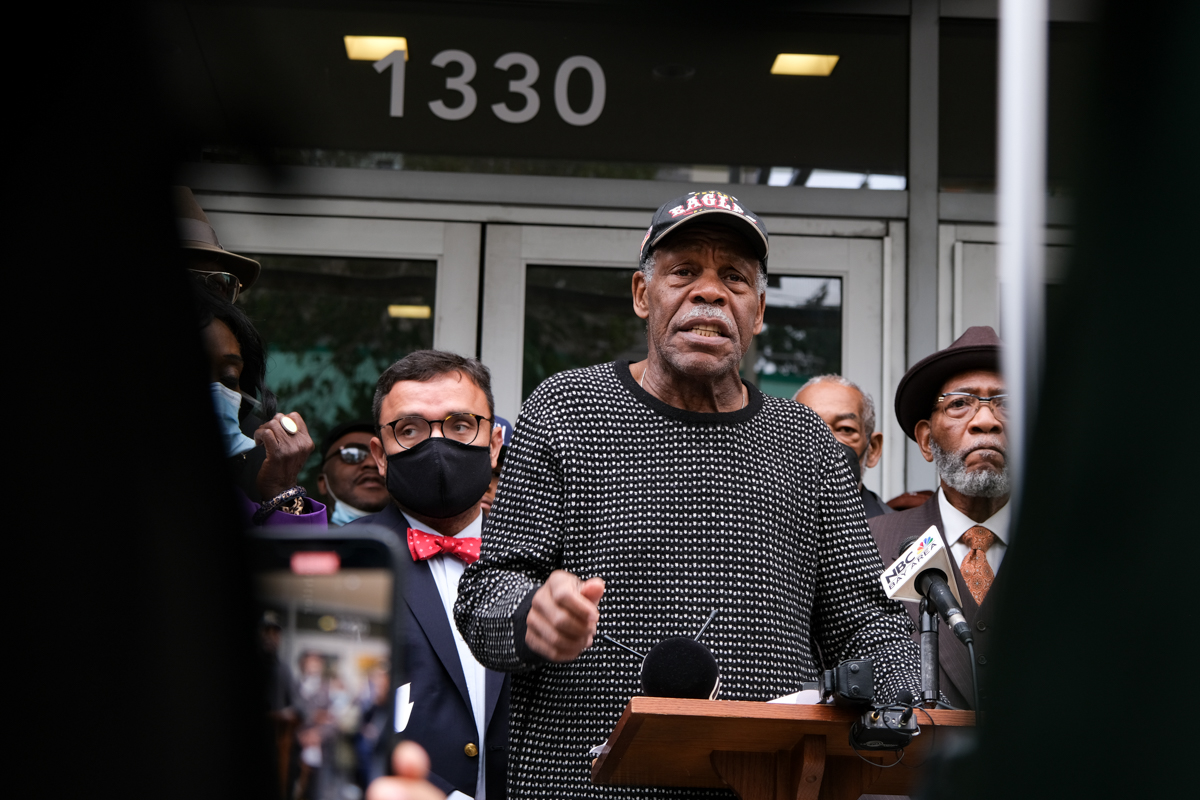Black leaders gathered in front of the Fillmore Heritage Center on Monday to demand the city donate the venue to a local nonprofit as a form of reparations to Black communities razed by redevelopment in the 1960s.
Led by Rev. Amos Brown, president of San Francisco’s NAACP chapter, Monday’s event was lively and star-studded, featuring a live band and guest appearances from actor Danny Glover and professional boxer Karim Mayfield, both of whom grew up in San Francisco. Brown, who also sits on the city’s Reparations Advisory Committee, described the fight for the Fillmore Heritage Center as part of a larger movement aimed at demanding investment in the city’s Black community.
“It’s going to take millions,” Brown told SF Standard. “And those millions are in this city.”
Brown and others at the event called on the city to deed the property and turn over the space entirely to a nonprofit called New Community Leadership Foundation, which works on land use and economic justice issues on behalf of Black and other disenfranchised communities in San Francisco. At the press conference, its director Majeid Crawford said that the nonprofit has “the resources now to immediately activate this space.”
Built in 2007, the Fillmore Heritage Center was designed as a central space for Black residents and the surrounding community to enjoy music, art and food. But the site has undergone tenant turnover, closures and disputes over a lease with the city of San Francisco that have kept the space underused for much of its lifetime.
In 2018, a shooting outside the center that killed one and injured four led the city, which owns the parcel, to refuse to renew a six-month lease to tenants New Community Leadership Foundation and the San Francisco Housing Development Corp., which had teamed up to reopen the center for live music and other events with a $50,000 grant from the city.
Brown described concerns over the shooting as a “red herring” to justify withholding the center from New Community Leadership Foundation.
Several city leaders took the podium on Monday in support of Black ownership of the center, including a staffer of Supervisor Dean Preston, who represents District 5, where the center is located. Supervisor Matt Haney, who represents District 6 and serves as chair of the city’s budget committee, promised to prevent the city from selling the center.
Brown and others traced the history of the Fillmore Heritage Center back to the infamous, so-called “urban renewal” of the Fillmore District that triggered the ongoing displacement of the city’s Black population.
As part of a decades-long, federally-funded project, large swaths of the predominantly Black Fillmore and Western Addition neighborhoods were razed, rezoned and replaced beginning in the 1960s. Thousands of homes, businesses and residents were displaced or destroyed during the redevelopment.
“It was not about redevelopment,” Brown told the crowd on Monday. “It was about Black removal.”
The lot where the Fillmore Heritage Center sits was first controlled by the San Francisco Redevelopment Agency, an independent entity established to oversee the redevelopment. Using a combination of redevelopment dollars and private funds, the mixed-use Fillmore Heritage Center was built in 2007 with Yoshi’s jazz club as an anchor tenant.
After Yoshi’s declared bankruptcy in 2014, the music venue was rebranded as The Addition, but the new venture only lasted 6 months before going under. That and other failing businesses inside the center prompted it to close entirely by 2015. Then, after New Community Leadership Foundation and the San Francisco Housing Development Corp. worked to revitalize the space, opening it to concerts, shows and classes in 2018, it was shuttered again following the shooting.
The center currently sits vacant.
In 2017, while the two nonprofits were temporarily leasing the space, the city issued a request for buyers, setting a sale price of $6.5 million and asking prospective buyers to submit proposals to purchase and run the center. The city later canceled the request for proposals, saying that it didn’t receive any qualifying bids.
One applicant, local businessman Agonafer Shiferaw, later filed a lawsuit accusing the city, and various officials involved with the process, of corrupt practices. In the federal lawsuit, Shiferaw charged that corrupt practices were “baked in” to the request for proposals, which required the formation of a community review panel led by Brown, and also accused the city of ongoing financial mismanagement of the center, including improperly waiving a $4.8 million loan to Yoshi’s proprietor Kaz Kajimura. The city asked a judge to dismiss the case, and a decision is pending.
On Monday, Black leaders reminisced on the days they could walk the streets of the Fillmore and find Black-owned businesses on every corner and a safe, tight-knit neighborhood.
“[Fillmore Heritage Center will] give Black folks a sense of place, a sense of meaning,” Brown said. “A sense of sensible pride.”
